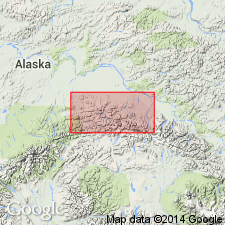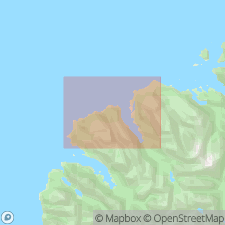
- Usage in publication:
-
- Nenana gravel*
- Modifications:
-
- Named
- Dominant lithology:
-
- Gravel
- AAPG geologic province:
-
- Alaska East-Central region
- Alaska Southern region
Summary:
Named for exposures on east bank of Nenana River between mouths of Healy and Lignite Creeks, Bonnifield region, east-central and southern AK. East of Totatlanika basin gravels reach most extensive development. Total area of unit within Bonnifield region is more than 600 sq mi. Materials of gravel composed of schists, quartzites, granites, all abundant in Alaska Range from which, no doubt, this material was derived. Greatest known thickness is 1760 ft on lower Healy Creek. Unconformably overlies Eocene coal series. Underlies Pleistocene(?) glacial deposits. Age may be Miocene based on erosion and stratigraphic relations.
Source: GNU records (USGS DDS-6; Menlo GNULEX).

- Usage in publication:
-
- Nenana Gravel*
- Modifications:
-
- Age modified
- Biostratigraphic dating
- AAPG geologic province:
-
- Alaska East-Central region
- Alaska Southern region
Summary:
Age is late Miocene and early Pliocene on basis of Clamgulchian Stage within unit.
Source: GNU records (USGS DDS-6; Menlo GNULEX).
For more information, please contact Nancy Stamm, Geologic Names Committee Secretary.
Asterisk (*) indicates published by U.S. Geological Survey authors.
"No current usage" (†) implies that a name has been abandoned or has fallen into disuse. Former usage and, if known, replacement name given in parentheses ( ).
Slash (/) indicates name conflicts with nomenclatural guidelines (CSN, 1933; ACSN, 1961, 1970; NACSN, 1983, 2005, 2021). May be explained within brackets ([ ]).

